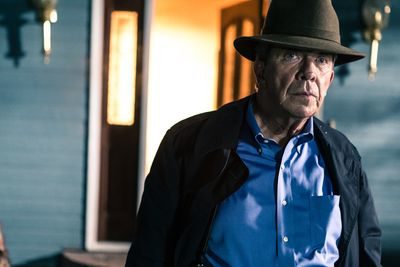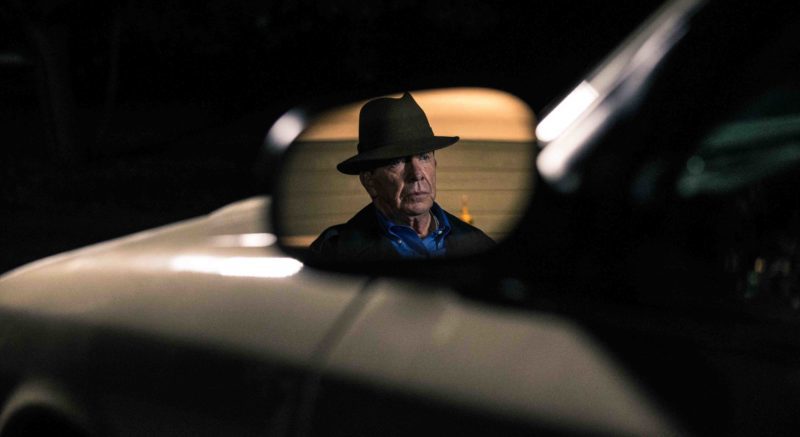INTERVIEW: Joe Kenda, the ‘Homicide Hunter,’ goes out on his own terms
Photo: Homicide Hunter returns to Investigation Discovery Aug. 28 for its final season. Photo courtesy of Investigation Discovery / Kim Cook / Provided with permission.
With a gravelly voice, furrowed brow and penchant for tell-like-it-is recitations, one could easily mistaken Joe Kenda for one of those old-time sheriffs in the Wild West. He means business, and any suspect that steps in his way falls under his scrutiny — and falls hard.
No, Kenda is not a historical figure, spitting tobacco into the dirt as he takes care of the bad guys. He’s actually the most famous reality TV star in the world of true crime, and he’s going out on his own terms.
Homicide Detective, featuring Kenda, will begin its ninth and final season on Investigation Discovery Wednesday, Aug. 28 at 9 p.m. The series has looked back at Kenda’s time as a homicide detective in Colorado Springs, Colorado, where he had a 92 percent solve rate and rose through to the rank of lieutenant.
“It was a decision I made,” Kenda said in a recent phone interview about the show’s ending. “I knew that day would come, and the day did. I didn’t want to be the athlete that stayed in the field one season too long, you know, so I said it was time. I didn’t have a sufficient number of cases of interest to be presentable in season 10. What I had remaining were either too simple or too gruesome, involving children and babies, and I won’t do that and neither will the network. So it was time.”
Kenda said he won’t miss the series, mostly because this has been an unexpected second act. He has been retired from law enforcement for some time and didn’t think a reality series would be successful. Also, one expects he won’t be away from television screens for too long.
“What I miss is my work and my career,” he said. “This has been great fun. It’s been therapeutic for me. I think it’s been educational for the public, but in terms of me being distressed about it, I’m not. … I never imagined that the first season would happen, let alone any others. I’m absolutely shocked at how successful this has been.”
In the time since Kenda became a household name, true crime has taken off as a television and podcast genre. Homicide Hunter and the entire Investigation Discovery network have been well-positioned in this cultural zeitgeist.
“My opinion would be this, that I think perhaps the public is tired of fiction because fiction takes on a certain sameness over time, and there’s always been programs about fiction,” the detective said. “They’ve been on television since there’s been television, and I think the real facts of what people actually do in their lives is more interesting to the public than yet another fictional story filled with sexual tension and all the usual components they put in these things. This is just people doing something incredibly violent and incredibly stupid all in the same time.”

Over the years, Kenda has had no difficulty recalling the details of the murder cases featured on Homicide Hunter. He said anyone in this line of work remembers the ins and outs of the cases. There are real human victims here, and their memories stay with him.
“They all have an element of mystery to them, but some have more than others,” he said. “And I think the public is fascinated by the mysterious aspect of it. Who did this? Well, we don’t know. That’s what we’re here to find out.”
Kenda wasn’t born with a badge and no-BS demeanor. He was 9 or 10 years old when he first started thinking about a career in law enforcement. The influence was his uncle who was on the Colorado State Patrol.
“I always admired him,” he said. “In fact, I named my son after him. My uncle’s name was Dan, and my son’s name is Dan. And that interested me because I admired him, and just one thing led to another. I thought there would be something I could do that would be useful and functional and contribute something to the planet in the process. … I was interested in homicide because I thought it must be the worst crime because we’ll do the worst to you if you commit it. We’ll put you in prison forever, or we’ll kill you. And that intrigued me.”
After he got into law enforcement, he started to have some fear about the job. This fear, no doubt difficult to deal with, was also natural given the cases he was looking into.
“Anyone that says that they’re not afraid when they’re a policeman, they’re either lying or they’re crazy,” he said. “I had fear all the time. Fear keeps you alive. It’s having the fear and moving through it and doing your job, that’s courage, but you’re always afraid. You ever have a metal taste in your mouth? You ever hear yourself breathe? That’s when you know you’re afraid.”
The people he put behind bars had a common denominator: emotion overcoming judgment. Humans, Kenda said, know that killing someone else is wrong, but in the heat of the moment, their judgment is set aside.
“Humans lose control,” Kenda said. “Animals kill for need because they must to survive. Humans kill for pleasure. That’s what makes them so dangerous. … We didn’t treat it as a job; we treated it as a mission. After a few drinks, you can convince yourself you work for God Himself.”
Although Homicide Hunter focuses on homicides in Kenda’s Colorado Springs case files, he is quick to point out that the city’s murder rate is average. He said it’s analogous to the economy.
“It goes up and down,” he said. “You have good years and bad years. Colorado Springs has an average crime rate. It’s not above average. It’s not below. It’s an average rate of crime for the number of humans that live there, and it bounces around a little bit year to year, decade to decade. But ultimately it stays pretty much the same, and it’s the same over the country. It doesn’t make any difference about where it is. It’s no worse than anyplace else. It’s ultimately no better either. It’s what it is. The crime rate is what it is.”
When Kenda describes crimes, he often uses that patented style of “telling it like it is.” This is probably why so many audience members have flocked to his reality series.
“I’m a black-and-white guy,” he said. “There is no gray. There isn’t, and there never has been. I’m very direct. That distresses a lot of people, but that’s the way I am. … I was born in a coal-mining town in Pennsylvania, east of Pittsburgh. My father was a coal miner. My grandfather was killed in a coal mine. They all worked in coal mines. Hard men doing hard work, and they saw and understood the world in black and white. And so did I.”
Still, there was the fear factor, and there was the emotion of each case. The suspects and their stories added up, and one day he needed to call it quits.
“I had enough,” Kenda said. “Emotionally I had enough. I became emotionally overwhelmed by it. It began to be white noise around me. I couldn’t deal with it anymore. I’m glad I did it. I was good at it, but I’m done with it. … That’s why I agreed to do the series because I consider it to be therapy. It made me feel better to talk about it.”
By John Soltes / Publisher / John@HollywoodSoapbox.com
Homicide Hunter, featuring Lt. Joe Kenda, will premiere its ninth and final season Wednesday, Aug. 28 at 9 p.m. on Investigation Discovery. Click here for more information.

